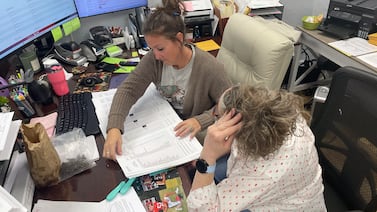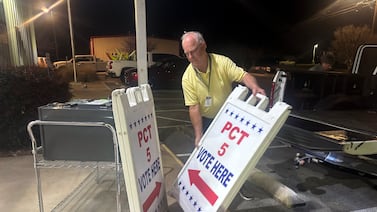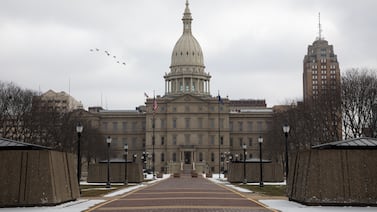Votebeat is a nonprofit news organization reporting on voting access and election administration across the U.S. Sign up for Votebeat Wisconsin’s free newsletter here.
What happened?
A federal appeals court ruled Monday against a Wisconsin town that disavowed electronic voting machines, siding with the U.S. Justice Department’s argument that this would unfairly harm voters with disabilities.
What’s the dispute?
Leaders of Thornapple, a town of 700 people in northern Wisconsin’s Rusk County, voted in 2023 to stop using electronic voting machines, in favor of allowing only hand-marked ballots. They did without the machines for two elections in a row, in April and August 2024.
The DOJ, under the Biden administration, sued the town in September 2024, arguing that its decision violated the Help America Vote Act, which requires every “voting system” to be accessible for voters with disabilities. Accessible voting machines allow voters with disabilities to hear the options on the ballot and use a touch-sensitive device to mark it.
The town argued that it wasn’t subject to the federal law’s accessibility provision because its use of paper ballots didn’t constitute a “voting system.”
A district court judge rejected the town’s argument last September, and ordered it to use electronic voting machines for the November presidential election. The town appealed that order, but did use a machine in November.
On Monday, a three-judge panel on the 7th U.S. Circuit Court of Appeals affirmed the lower-court order, finding that “individuals with disabilities would lack the opportunity to vote privately and independently if they only had access to a paper ballot.”
The court based that finding partially on Thornapple Chief Inspector Suzanne Pinnow’s testimony about a blind woman who relied on her daughter’s assistance to fill out a ballot, and a man who had a stroke and who needed Pinnow to guide his hand so he could mark a ballot.
Who are the parties?
The DOJ had sued two northern Wisconsin towns and their officials in September after both decided not to use electronic voting equipment for at least one federal election. One of the towns, Lawrence, immediately settled with the Justice Department, vowing to use accessible voting machines in the future.
Thornapple officials decided to fight the case. They’re currently represented by an attorney with the America First Policy Institute, a group aligned with President Donald Trump.
Why does it matter?
The case reaffirms what has long been election practice in Wisconsin: Every polling place must have an electronic voting machine that anybody can use but is especially beneficial for voters with disabilities.
Distrust of voting machines, which has grown on the right following misinformation about the 2020 election, has led to a movement to ban them across Wisconsin. But the Thornapple case shows that for now, municipalities still have obligations under federal law to allow voters to cast ballots on electronic machines.
The case is relevant nationally, too. Since Trump took office in January, the U.S. Justice Department has withdrawn from multiple voting-related cases. But the Justice Department forged ahead in this lawsuit, signaling that, at least for now, it is not backing the movement to forgo electronic voting equipment entirely.
What happens now?
Thornapple is “considering our options,” said Nick Wanic of the America First Policy Institute. The case could get appealed to the U.S. Supreme Court or proceed in the lower federal court.
Although the order that required Thornapple to use accessible voting machines applied only to the November 2024 election, at this point, two federal courts in this case have ruled that towns must have accessible voting machines for people with disabilities.
“Voters with disabilities already face many barriers in the electoral process, and making sure they have access to a voting system which allows for basic voting rights to be met is a minimum — and legal — standard that they should not be worried about when exercising their right to vote,” said Lisa Hassenstab, public policy manager at Disability Rights Wisconsin.
Read more of Votebeat’s recent coverage about the dispute over electronic voting machines in Wisconsin:
- Feds target two Wisconsin towns over lack of accessible voting machines
- Feds sue two Wisconsin towns for failure to use accessible voting machine
Alexander Shur is a reporter for Votebeat based in Wisconsin. Contact Alexander at ashur@votebeat.org.






